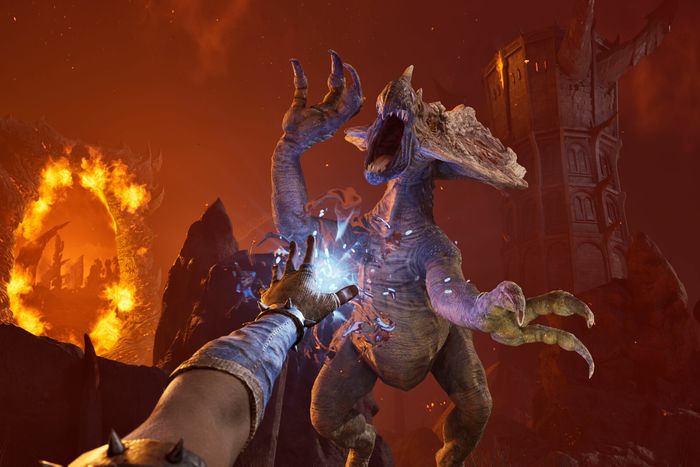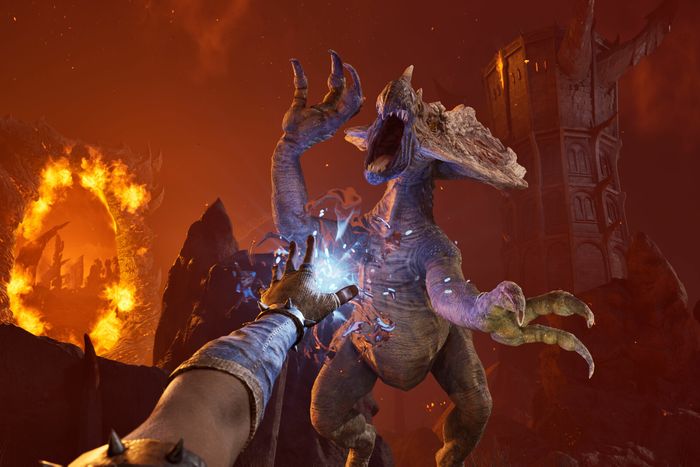Bethesda’s Quantum Leap

Photo: Bethesda Game Studios, Virtuos
Bethesda Game Studios needs to turn its reputation around. The teaser trailer for the sequel to the 2011 blockbuster The Elder Scrolls V: Skyrim landed in 2018; no concrete news followed. Fallout has reached a wider audience as a TV series, but the 2018 multiplayer misfire Fallout 76 left many fans of 2015’s Fallout 4 baying for blood. 2023’s Starfield, which introduced astronauts to the homesteading and dungeon crawls of Bethesda’s other games, matched the jank of its open-world siblings but not the soul; vampire first-person shooter Redfall tanked, and the closure of Arkane, the studio that worked on it, drew massive outrage. 2025 is looking promising for the Maryland-based studio, though. With its Indiana Jones and the Great Circle coming out of Microsoft exclusivity and doing well on Playstation 5, The Elder Scrolls: Oblivion Remastered claiming to reach four million players mere days after a (sort of) surprise launch, and Doom: The Dark Ages reviving the Luciferian shooter series in May, Bethesda seems anxious to prove it’s still capable of crafting unforgettable solo gaming experiences.
The story was a lot simpler a few decades prior, when Bethesda was scrappily revolutionizing role-playing games by fusing the depth of story in tabletop experiences like Dungeons & Dragons to tight action/adventure gameplay — and birthing endless memes for unusual bugs and absurd voice-over lines. Oblivion Remastered sees Virtuos giving the 2006 entry in the Elder Scrolls series an Unreal Engine 5 shellac job. Arriving in an era of worrying press for Bethesda after the Starfield DLC Shattered Space failed to quash frustrations over its pedestrian story and barren worlds, Oblivion plucks nostalgia strings; at its best the remastered game reminds us of a Bethesda classic’s knack for fostering countless hours of exploration while offering a taste of a Scrolls tuned to modern hardware. But is it enough to restore the studio’s reputation while it workshops another comparable experience? Oblivion returns to a world where the two-year-old Elden Ring is already halfway to Skyrim’s 60 million in cumulative sales. This is an era of action RPGs coated in the fingerprints of FromSoftware’s brutal, impressionistic Dark Souls.
The Bethesda gameplay loop is simple, but sprawl lends it a sense of depth. Hoofing across an idyllic (or apocalyptic) landscape to some visual point of interest, you encounter an object or non-player character leading to a quest that requires you to leg it to a dangerous second location and back, but along the way you discover half a dozen other mission cycles across enveloping, unpredictable scenery. Using one of your assigned skills improves it: Jumping in place for an hour in Scrolls makes you a better acrobat. Suspenseful storytelling, deep spelunking, and granular control over everything from the size of your character’s chin to interactions between the world’s factions hooked players on the routines. The series is a delicate act of luring normies into a love of computer RPG mechanics one branching quest line and dialogue tree at a time, and Oblivion is the sweet spot between the much more strenuous Elder Scrolls III: Morrowind and the perhaps too streamlined Skyrim. The emperor (Patrick Stewart) has been assassinated; the Prince of Destruction is invading, and you’re fated to help.
It’s a wise point for Bethesda to return to. You see the studio’s future coming into shape before the foibles set in. Oblivion’s lush forests are breakthroughs for Bethesda in procedural generation, but the practice also made navigating the prince’s lava-filled realm a drag. Starfield, Skyrim, and Fallout 4 each operated with a certainty that people would spend dozens of hours in their worlds, and unruly player authority over story beats was incrementally buried by procedurally generated fetch quests and creative expression via a castle, settlement, or ship of one’s own to maintain. You could sojourn for knicknacks or stave off raids on your villages forever.
Oblivion works for it with a verdant world slightly larger and arguably more varied than Skyrim’s. (Oblivion is set in the central imperial province of Scrolls’s fictional continent of Tamriel, while the 2011 game visited the frostier, Nordic northern reaches.) It’s as beautiful as it is batshit. The studio’s embryonic fiddling with more realistic-feeling NPC intelligence coupled with the bugs that play testing missed made for a game you could take seriously — or break hilariously. The remaster preserves most of this character but is, true to Bethesda form, a few ticks wonkier at launch than you’d expect something with its money and magnitude to be. The crispness of the presentation can be a little creaky, the file is massive, third-person-run animations have latent Naruto energy, and pop-in glitches abound. Exiting Frostcrag Spire, a mountaintop wizard fortress overlooking rolling, snowy hills, you watch layers of trees and clouds abruptly springing into frame, like a nearsighted player character equipping a pair of glasses.
A 19-year-old game should not run choppily. But some jank — odd lighting interactions between trees and moons or massive cathedral steeples visible from far away whose gorgeous stained-glass window art only loads inside town — feels oddly fitting for a game about jarring spiritual and geographical contradictions. It generally wears its tune-up well: The remaster tones the washed-out green of the original down dramatically in favor of more dynamic contrasts between nature and weather. The setting sun drapes the realm in orange, and lamplight complicates shadow-play. Ogling purple homes in the beguilingly quaint castle town of Cheydinhal, fiery mazes in the titular hell-realm of Oblivion, psychedelic forests in the madness-themed Shivering Isles all feels like meeting with an old friend who cleaned up on the surface at no cost to a notorious recklessness still percolating behind the scenes.
Changes to gameplay are careful but largely welcome. The run button is new to Oblivion; the character creator ditched gender-based stat spreads. UI is slicker all around than the original mess, except for dungeon maps, which you get to by zooming all the way in from the world map. Virtuos could’ve tweaked things further: Untouched is the frustrating level scaling that raises enemy stats to meet yours. Oblivion is still a game where you juice up apprehensively, loathe to grant the matching power boost to everything from demon-alligator daedroths to lowly mudcrabs.
Retracing this story of perennially crafty elves, doomed crusaders, and dead emperors recenters the pomp and purposeful worlds that Fallout 76 and Starfield sidelined in Bethesda’s quest to realign their games with trends in multiplayer gaming and AI. Fans crave spaces for acts of magical violence, experiences free of feature creep and bloated systems, full instead of scintillating lore, deranged cultists, and sadistic armaments. But the jury is out on whether the company will take the hint. Skyrim, Fallout 4, and Starfield director Todd Howard still doesn’t feel like the last game tripped up on its “Skyrim in space” ambitions. Bethesda, owned by Microsoft since the PC giant acquired its parent company, ZeniMax Media, in 2020, doesn’t share its sales data but Starfield’s player count cratered fast, suggesting unforeseen ripples in its expected splash as a big Game Pass drop. Oblivion Remastered hints that the RPG jewel in Xbox’s repertoire is aware of interest in its vaunted catalogue and capable of doing justice to old workhorses (annoying crashes, frame-rate dips, and pop-in notwithstanding). Beaks are wet with the old lore again.
But Bethesda has issues that this doesn’t resolve. The question of whether the studio can still produce a solo RPG experience on the level of the false god dethronement of Morrowind or the D.C. ruin excavation of Fallout 3 remains open. Complaints against the parent companies grow ever more concerning. ZeniMax’s worker union has been in contract negotiations for two years and authorized a strike earlier this month. A week later, Xbox was added to the Palestinian Boycott, Divestment, and Sanctions movement’s list of companies to avoid as criticism mounts for Microsoft’s dealings with the Israeli army. Oblivion Remastered landing right now implies a hunger for a shift not just in long-term thought about Bethesda but also short-term narratives around the Xbox, which is rolling out new price hikes on top of getting smoked in this round of console wars.
As is the case with the yassification of Oblivion’s green hills and zombie-filled crypts, it’s off-putting for a patina of pleasantness to paper over the jagged realities. Gaming influencers rhapsodizing about the remake’s refined visuals and UI potentially restoring the old feeling at Bethesda ignore a sense that everyone in Scrolls’s chain of ownership would love for them to be talking about that instead of other news of the past year, from disappointing DLC to protests of parent companies. The message inside Bethesda’s sculpted worlds of harrowing decisions that a good time simply never comes for free holds just as true beyond the screen.





